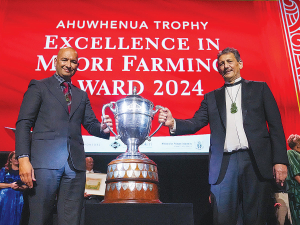Award-winning Māori farm severely damaged by isolated Northland thunderstorm
One of the country's top Māori farms has been badly damaged by a severe isolated thunderstorm which hit parts of the east coast of Northland last week.
 Wairarapa Moana ki Pouakani chair Kingi Smiler (right) receives the Ahuwhenua Trophy from Maori Development Minister Tama Potaka at the awards night. Photo Credit: Alphapix.nz
Wairarapa Moana ki Pouakani chair Kingi Smiler (right) receives the Ahuwhenua Trophy from Maori Development Minister Tama Potaka at the awards night. Photo Credit: Alphapix.nz
A dairy farm near the settlement of Mangakino has won the prestigious Ahuwhenua Trophy for the top Māori dairy farm for 2024.
There was an outpouring of excitement and jubilation when Wairarapa Moana ki Pouakani (WMI) was announced the winner by the Minister for Māori Development Tama Poutaka at a gala dinner held in Hamilton recently. Whanau quickly rose up and went on stage to the sound of waiata and haka as Potaka presented the trophy to the chairman of WMI, Kingi Smiler. For him it was a special moment as he has connections to the past two winners (for sheep and beef and horticulture) of this prestigious trophy.
The function was attended by 860 people, which included the Prime Minister Christopher Luxon, Finance Minister Nicola Willis, the Māori King Tuheitia along with diplomats from the United Kingdom, Ireland, the European Union and Canada. There were also representatives of central and local government, agribusiness leaders, sponsors of the awards, previous winners and whānau from all the finalists.
Beside the main trophy, a replica of it, a special gold medal and a certificate were presented to representatives of Wairarapa Moana by Nicola Willis, chief executive of Te Puna Kokiri Dave Samuels, and Glen Webber from the Ministry for Primary Industries (MPI).
WMI consists of 12 dairy units across 4300ha, plus three dairy support units. But it entered just one of its 12 farms in the competition, Farm 4 - the winning farm. The property has a milking platform of 300ha, milking 980 cows and producing and 416,000 kgMS. All up, WMI produce about five million kilograms of milksolids from their 12,000 cow herd and are the largest supplier to milk processor Miraka Ltd.
The other finalist in the competition was Whakatohea Māori Board whose farm is near the Eastern Bay of Plenty township of Opotiki.
Potaka described the Ahuwhenua Trophy as the most prestigious award in Māori farming that acknowledges and celebrates business excellence in NZ's important pastoral and horticultural sectors. He says for Māori the award is a demonstration of success and pride but also a demonstration of identity which is inextricably linked into land, seas, forests, mountains and rivers.
"What we saw at the awards night was an expression of identity," he says.
Potaka says there is a real conviction among Māori farmers and Māori practitioners that they have an intergenerational responsibility for the future of their land and that this will not be reduced by the ups and downs of the current economic climate.
He says such views are also held by many Pakeha farming families who take a long-term, intergenerational view of caring for their land and future generations.
Potaka praised the high quality of all the finalists and looked forward to seeing more of their future success, adding that Wairarapa Moana ki Pouakani are a strong example of Māori dairy farming excellence.
"I've seen first-hand the hard work, brilliance and innovation demonstrated by Māori farmers. It's a critical part of the Māori economy and is a powerful driver in ensuring we get the New Zealand economy back on track
"It's about building economic benefits while ensuring kaitiakitanga - nurturing their whenua for future generation and inspiring others," he says.
Māori Economy
For Finance Minister Nicola Willis, it was her first experience of attending the awards evening. She says she loved it and that it was wonderful to see the dairy industry celebrated in this way.
She says she was particularly impressed with the finalists in the Young Māori Farmer competition.
"The Māori economy is huge and has been growing very fast and is of massive potential. It's grown from $16 billion to $70 billion in only 20 years and is making a huge difference to the whole of the economy of the country," she says.
Willis says it's great to see post settlement iwi making sound investments, creating more value and employing more people and she expects to see even more of that in the coming years.
Agrisea NZ has appointed Craig Hudson as it's new chief growth officer.
State farmer Landcorp, trading as Pamu, is a forecasting a full-year net profit of around $100 million.
Tony Aitken, chief executive of Ruralco, has been awarded the Excellence in Business Leadership Award at the ANZ Business of the Year Awards.
Global trade has been thrown into another bout of uncertainty following the overnight ruling by US Supreme Court, striking down President Donald Trump's decision to impose additional tariffs on trading partners.
Controls on the movement of fruit and vegetables in the Auckland suburb of Mt Roskill have been lifted.
Fonterra farmer shareholders and unit holders are in line for another payment in April.
OPINION: Staying with politics, with less than nine months to go before the general elections, there’s confusion in the Labour…
OPINION: Winston Peters' tirade against the free trade deal stitched with India may not be all political posturing by the…